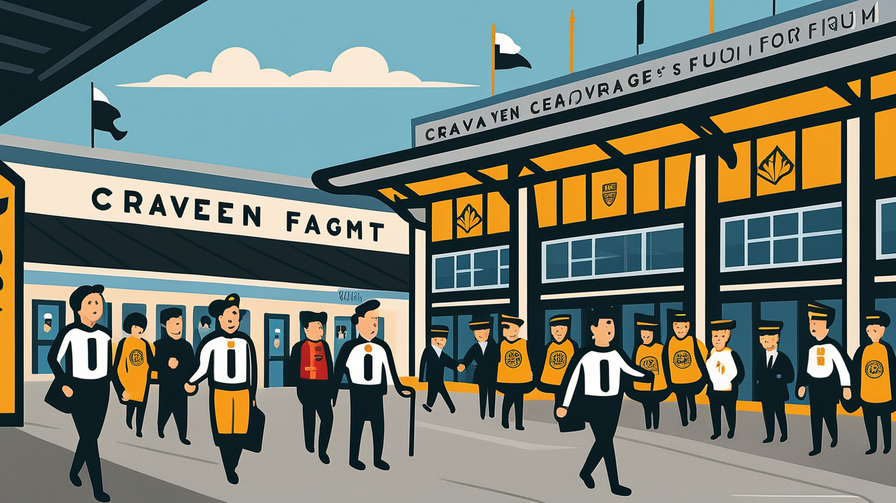[Disclaimer] This article is reconstructed based on information from external sources. Please verify the original source before referring to this content.
News Summary
The following content was published online. A translated summary is presented below. See the source for details.
Fulham Football Club, a historic English Premier League team, has partnered with Oracle to revolutionize its food and beverage operations at Craven Cottage stadium and the new Fulham Pier riverside destination. The club is implementing Oracle Simphony point-of-sale (POS) and Payments technology to create faster, more efficient concession experiences for fans. This cloud-based system will replace outdated cash registers and payment terminals with modern, integrated technology that can handle the massive crowds on match days. The new system allows for contactless payments, mobile ordering, real-time inventory tracking, and detailed analytics about fan preferences. Staff will use handheld devices to take orders throughout the stadium, reducing wait times at concession stands. The technology will also enable Fulham to offer personalized promotions and loyalty programs. At Fulham Pier, the club’s new hospitality venue on the Thames River, the Oracle system will support year-round dining operations, not just match days. This modernization effort aims to enhance the overall fan experience while increasing revenue and operational efficiency.
Source: ORACLE News
Our Commentary
Background and Context

Fulham Football Club, founded in 1879, plays at Craven Cottage, one of England’s most charming and historic stadiums, located on the banks of the River Thames in London. The Premier League, where Fulham competes, is the world’s most-watched soccer league, attracting billions of viewers globally. Match day experiences at stadiums have evolved from simple hot dogs and beer to sophisticated dining options, but many clubs still struggle with long lines and slow service that cause fans to miss game action. The new Fulham Pier development represents the club’s ambition to create year-round revenue streams beyond the traditional football season, which runs from August to May.
Expert Analysis
Sports business experts recognize that modern stadiums must function as entertainment destinations, not just sports venues. The Oracle Simphony system represents a significant technological leap for stadium operations. Traditional stadium concessions often operate with separate systems for ordering, payment, and inventory, leading to inefficiencies. Cloud-based POS systems allow real-time data analysis – for example, if hot chocolate sales spike during a cold match, managers can immediately shift inventory and staff. This technology also provides valuable data about fan behavior, helping clubs understand which products sell best at different times and locations within the stadium.
Additional Data and Fact Reinforcement
Stadium concessions are big business: Premier League clubs collectively generate over £300 million (approximately $380 million) annually from food and beverage sales. The average fan spends £15-25 on concessions per match. With Craven Cottage’s capacity of 25,700, even small improvements in service speed can significantly impact revenue. Studies show that 42% of fans avoid concessions due to long lines, representing millions in lost sales. Modern POS systems can reduce transaction times from 90 seconds to under 30 seconds. The ability to accept contactless payments is crucial – over 80% of UK transactions are now cashless.
Related News
Fulham’s tech upgrade follows similar moves by other Premier League clubs. Manchester City partnered with Amazon for checkout-free stores, while Tottenham Hotspur’s new stadium features the world’s first in-seat beer delivery system. The trend extends beyond England – American sports venues like Seattle’s Climate Pledge Arena use Amazon’s “Just Walk Out” technology. Oracle has been aggressively expanding in the sports sector, providing cloud services to Formula 1 and the Golden State Warriors. This reflects broader digital transformation in sports, where data analytics, fan engagement apps, and smart stadium technology are becoming standard.
Summary

Fulham FC’s partnership with Oracle demonstrates how traditional sports clubs are embracing technology to enhance fan experiences and boost revenues. By modernizing its food and beverage operations with cloud-based systems, Fulham aims to reduce wait times, increase sales, and gather valuable data about fan preferences. This investment shows that even historic clubs recognize the need to adapt to modern consumer expectations.
Public Reaction
Fulham supporters have largely welcomed the announcement, with many sharing horror stories of missing goals while queuing for halftime refreshments. Season ticket holders are particularly excited about potential mobile ordering, allowing them to order from their seats. Some older fans express concern about the move away from cash payments, worrying about digital exclusion. Local residents near Fulham Pier are optimistic that improved hospitality operations will make the venue a year-round destination, potentially boosting the local economy. Rival fans joke that Fulham needs to modernize their team performance as much as their concession stands, reflecting the good-natured rivalry common in English football.
Frequently Asked Questions
Q: What is a point-of-sale (POS) system?
A: A POS system is the technology used to process sales – think of the register at a store. Modern POS systems do much more than just take payment; they track inventory, analyze sales patterns, and manage staff schedules.
Q: Why do stadiums need special technology for food service?
A: Stadiums face unique challenges – they need to serve thousands of people quickly during short breaks in play. Regular restaurant systems can’t handle this volume and speed requirement.
Q: What is cloud-based technology?
A: Instead of storing information on computers at the stadium, cloud technology stores it on internet servers. This allows managers to access real-time data from anywhere and makes the system more reliable and secure.


